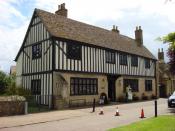The assumption of absolute monarchy logically implies not only that the king is politically sovereign, but also that he dominate the economic and religious life of his kingdom. Absolute rulers, whether Catholic or Protestant, have always favored a single established religion under their control. King James was victim to the political battles and James's greatest political problem was his Catholicism, which left him alienated from both parties in Parliament. In the seventeenth century, there were several important factors that led the English to move from absolutism to a government in which the monarch had little power and Parliament had more power. The factors that led to this include the events during the reign of the Stuart kings, James I and Charles I; religious problems and diversity; and Oliver Cromwell's absolutist rule. James I, the founder of the Stuart line of English kings, was a firm believer in the divine right of kings, as was his son, Charles I, who ruled for eleven years without ever summoning Parliament.
The religious situation in England had many problems. One of these was opposition to the Church of England from the Puritans, Calvinists, and the Roman Catholics. After the execution of Charles I, Cromwell governed England essentially as an absolutist ruler. By the end of the 1600's, many events brought about the belief that Parliament should have recognized as the ruling group of the people and that even the king should be subject to the laws of Parliament. One of the main causes of both the civil war in England, and the fall of absolutism was religious diversity. There were several main religious groups in England at this time, Puritans, Calvinists, Anglicans, and Roman Catholics. Puritans were dissatisfied members of the Church of England. They felt that the Reformation had not gone far...


